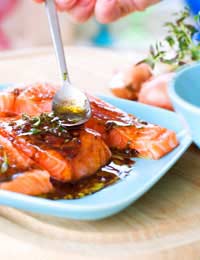Basic Cooking Terms

In order to follow a recipe there certain basic cookery terms that you should be familiar with. There's no real secret to it and you don't need any previous experience to create a dish from scratch but it's best to be at least a little prepared. While slicing and dicing might sound similar, they're actually different processes and can affect the final taste and appearance of your dish. We'll just go through some of the basics so next time you flick through a recipe book you won't shudder and settle for beans on toast again.
Al dente
If you're a pasta fan this is a term you'll become very familiar with. It literally translates from Italian as 'to the tooth' and basically means cooking your pasta so it still has a little bite to it and isn't a big, soggy mess.Baste
This is when you baste meat with a sauce or marinade as it cooks (ie brush the juices from the meat over the top of the joint). Roast lamb or chicken will benefit from being basted with the juices in the pan during cooking, in order to keep the meat moist.Beat
Eggs are the usual recipients of this technique. Hold the bowl to your chest with one hand and then beat the eggs firmly with a fork or whisk, with the other hand.Blanch
Some vegetables should be cooked very briefly and will literally be dropped into boiling water for a minute. You can also blanch tomatoes, and other vegetables and fruit, if you want to remove the skin.Chop
Let's face it; no one's going to be put off cooking because they don't understand this term. However, pay attention to any precedding words as you might be asked to 'roughly' or 'finely' chop and there's a big difference!Cream
Not the stuff you pour over apple pie - this is a culinary term that's often used in baking. You generally cream together the butter or margarine and sugar.Dice
This is when you chop ingredients into neat cubes.Fillet
If you're a novice cook you probably won't be tackling too many recipes that call for filleting. It's a bit of a skill but once mastered is very impressive! You fillet fish and meat in order to remove the bones.Julienne
A posh form of chopping whereby you cut vegetables into long, fine, even strips.Marinate
A sauce (marinade) is made and meat or fish are left to soak up the juices before cooking. Depending on the recipe, the food might be left to marinate for anything from a few minutes to overnight. It's always kept in the fridge.Pare
Peeling the skin from a vegetable or fruit.Poach
This is a method that uses water or other liquid to gently cook food. The liquid is brought to a simmer and then the ingredients are added to the pan. Poached eggs are a healthy alternative to fried, and fish is kept moist and tender when it's poached in milk.Purée
This is finer than mashing but it's basically the same process. For really creamy potatoes, you might purée them. You can use a sieve or a food processor. Other great vegetables purées include pea, and sweet potato - both great as an accompaniment to fish or chicken.Sauté
This is where food is cooked briefly over a high heat, so you might sauté onions or chopped bacon.Season
This generally refers to salt and pepper and you'll often see this instruction in a recipe book. If it's referring to anything other than salt or pepper, it will say. Other seasonings are most likely to be spices or herbs.Simmer
Simmering is a more gently way of cooking than boiling as the water doesn't disturb the food as much.Slice
To cut food into neat, even pieces.So, now that's the basics dealt with, you should feel a bit more confident about working your way through a recipe. It's all about practise and building up some confidence in the kitchen. The only way you'll do that is to roll up your sleeves and get your hands dirty.


Re: Working Out a Food Budget
Great advice! Setting a food budget is all about balance, and these tips really help to keep things manageable without compromising on…
Re: How to Make Basic Sauces
nice, but i think it would be better if you had, like, satay sauce, and garlic dip. but still, nice.
Re: Organising Your Kitchen
how do l cook jollof rice and frid rice..also vegetable soup..
Re: Dinner in 10 Minutes
What else can you do with jacket potato I have butter and a bit of gravy with mine
Re: The Quick Guide to Great Cooking
i'm a student want to learn more basic sauce and any additional ingredients for cream sauce white sauce.thank you
Re: Ten Ideas for Jacket Potatoes
Please could you add pictures of the goods if possible.
Re: How to Cook Fish
Your advice on poaching (and other ways of cooking) haddock seems very sensible and in touch with real life. This ( I know comparisons are odious…
Re: Ten Ideas for Jacket Potatoes
Could you help me with easy toppings for jaket bbq bake potatos ,for to cook 30 at a time need some help ,so come all you great…
Re: Meals for £1
Bb - Your Question:Students don't have luxrys like oil and an onion just hanging about or pepperOur Re
Re: Cooking in Bulk
Go into supermarkets late in the day and pick up reduced veg, Take home cut up in dinner portion Bags up in freezer bags Put in freezer til you…